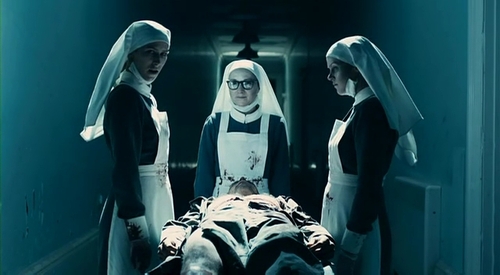"Red Sector A," Rush, 1984
 |
| "Red Sector A," 1984, album cover. |
With the recent trend of apocalyptic and post-apocalyptic societies in young adult fiction as well as music, it has become much more common to relate the themes often found in these novels and songs to earlier literature. A classic example of using modern interpretations is found in many Shakespeare productions. I remember attending multiple Shakespeare plays where there was a much more modern context, not necessarily in costuming and set design, but also in the acting. Two instances of this that particularly stood out to me were in Hamlet and A Midsummer Night’s Dream. Due to the timeless subjects, characters, and figurative language, Shakespeare plays such as these, as well as Macbeth, can be related to a number of modern themes and issues within various forms of art like visual art, literature, and music. Shakespeare's Macbeth holds many parallels with the 1984 post-apocalyptic Rush song “Red Sector A” within mood, prevalent themes, and story line.
 |
| The three witches in the 2010 screen adaptation of Macbeth. |
The mood of the song “Red Sector A” is questioning, fearful, and dark which applies directly to Macbeth. Characterized by a driving synthesizer melody, guitar riff, and drum beat, “Red Sector A” depicts a dismal mood that fits the pessimistic post-apocalyptic lyrics. When reading as well as watching the 2010 screen adaptation of Macbeth by Rupert Goold, the song “Red Sector A” immediately came to mind due to the war imagery as well as the overall tone of fear until insanity. The lyrics “All that we can do to help ourselves is stay alive” can be applied to the survival of oneself, but it also portrays the idea of a shift towards selfishness in times of desperation (“Red Sector A,” 2). This applies to Macbeth due to the fact that as he dives deeper into preserving his title as king, he also becomes more selfish and willing to do whatever it takes to get rid of obstacles. Fear is also a rampant theme in both Macbeth and “Red Sector A” due to the prisoners’ fear of their future fate and whether or not they will stay alive in “Red Sector A” and Macbeth’s obsession with his supposed destiny. When Macbeth meets with the three witch and they prophecy a seemingly impossible way for one to defeat him, it solidifies his obsession with fate and the witches’ prediction by saying, “But yet I’ll make assurance double sure, and take a bond of fate” (Shakespeare, Act IV Scene 1 Lines 16-7). The role that fate and destiny play in both Macbeth’s insanity as well as in the hopes of the prisoners in “Red Sector A” bring into question whether fate is real or if it is a psychological fixation that drives one to guarantee something to happen in order to follow their supposed path in life.
 |
| The three main members of the band Rush. |
Prevalent in “Red Sector A,” the themes of distrust and descent into madness also appear in Macbeth. The lyrics “a wound that will not heal/a heart that cannot feel” directly relate to Macbeth’s character because of the shared themes of something poisoned by experiences (“Red Sector A,” 8-9). Within Shakespeare’s Macbeth, Macbeth and Banquo meet three witches who prophecy that Macbeth will become King. At first Macbeth is not sure what to trust, but later he begins to give into temptation when he says “Why hath it given me earnest of success, commencing in a truth? I am thane of Cawdor. If good, why do I yield to that suggestion whose horrid image doth unfix my hair” (Shakespeare, Act I Scene 3 Lines 136-139). This line shows the way that the witches’ message infects Macbeth and how Macbeth’s growing hunger for power causes him to think about doing horrible things, mainly murdering King Duncan, that will get him the power he wants. Just as in the Rush lyrics, Macbeth’s heart begins to not feel anymore as the only thing in his sight is the thought of being king. This concept is also expressed in the Rush song “Red Sector A” through Macbeth’s similar “sickness to insanity” that gradually dehumanizes him (“Red Sector A,” 12). This is shown especially when Macbeth hallucinates seeing Banquo’s ghost after he has him killed, saying, “Thou canst not say I did it. Never shake thy gory locks at me” (Shakespeare, Act III Scene 4 Lines 91-92). This line depicts how though Macbeth may still contain a bit of human guilt, he is more worried about his plot being discovered and being blamed rather than actually being guilty for the murder of Banquo. As communicated through the lyrics of “Red Sector A”, Macbeth’s gradual descent into madness dehumanizes him as an immoral character, but also humanizes him as an imperfect person driven by greed and power.
 |
| Banquo's ghost in the 2010 screen adaptation. |
The storyline and setting of “Red Sector A”, though it seems unrelated to Macbeth, actually holds many similarities with Shakespeare’s play. The lyrics “Prayer to profanity” (“Red Sector A,” 13) symbolize the prisoners’ prayer to higher deities for help to their eventual cursing of them for leaving them there. This is representative of how “brave Macbeth—well he deserves that name—” was worshipped for the way he fought for the king, and how that admiration shifted to the point of hatred when Macbeth gave into his greed (Shakespeare, Act I Scene 2 Line 16). The lyrics “Are the liberators here? Do I hope or do I fear?” also show the uncertainty around trusting others and whether or not they are in league with Macbeth (“Red Sector A,” 18-19). This is shown through the conversation between Malcolm, the king’s son, and Macduff, during which Malcolm says to him, “You may deserve of him through me, and wisdom to offer up a weak, poor, innocent lamb t’ appease an angry god” (Shakespeare, Act IV Scene 3 Lines 16-18). Within this line, Malcolm is trying to test Macduff’s loyalty to King Duncan, showing both his uncertainty of Macduff and the reach of Macbeth while still hoping that Macduff will help help him as a liberate his people from Macbeth’s regime. The whole concept of a post-apocalyptic or dystopian society can apply to Macbeth in the way that there is an authoritarian regime plagued with conflict and war, contributing to the further suffering of the people as they are forced to conform, which is also reflected in the prison camp setting of “Red Sector A.”
 |
| Patrick Stewart as Macbeth in the 2010 screen adaptation. |
On the surface level, a 1984 post-apocalyptic progressive rock song doesn’t seem like it would hold many similarities with a Shakespeare play from 1606. There is such a big assumption that different generations can’t relate to each other due to the varied environments they were immersed in. However, the deeper connections and parallels between the mood, prevalent themes, and storyline in “Red Sector A” and Macbeth only prove that the human condition is something that will never change. We continue to read Shakespeare because it allows us to break down stories to their raw human emotions and experiences, regardless of time period or greater context. In this way, modern interpretations of Shakespeare do not change the plot but rather enhance it, allowing artistic freedom while still maintaining Shakespeare’s original message to humanity.
No comments:
Post a Comment